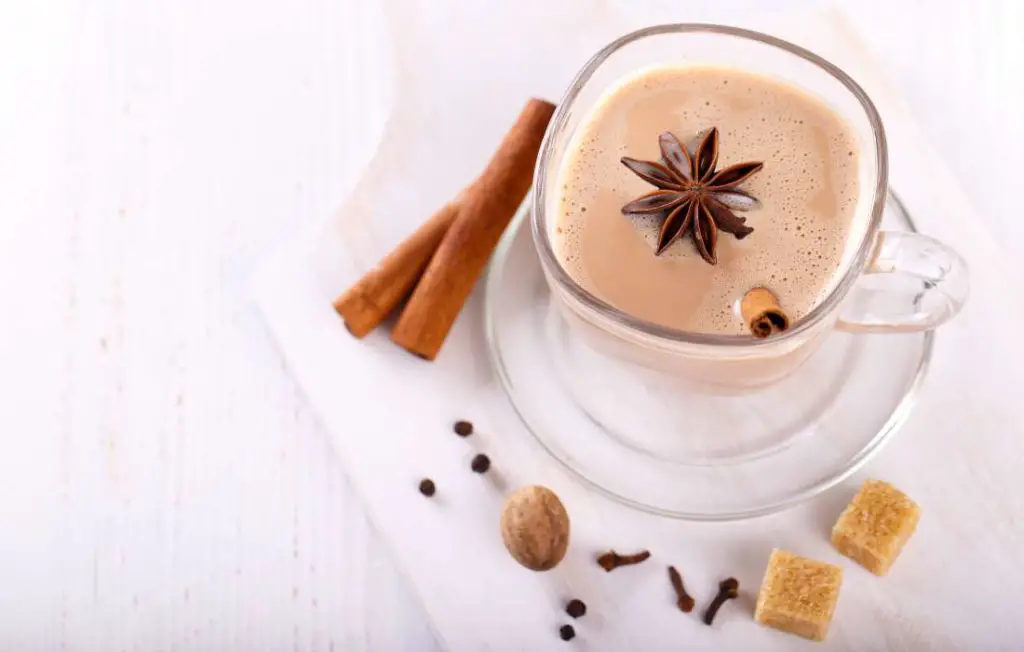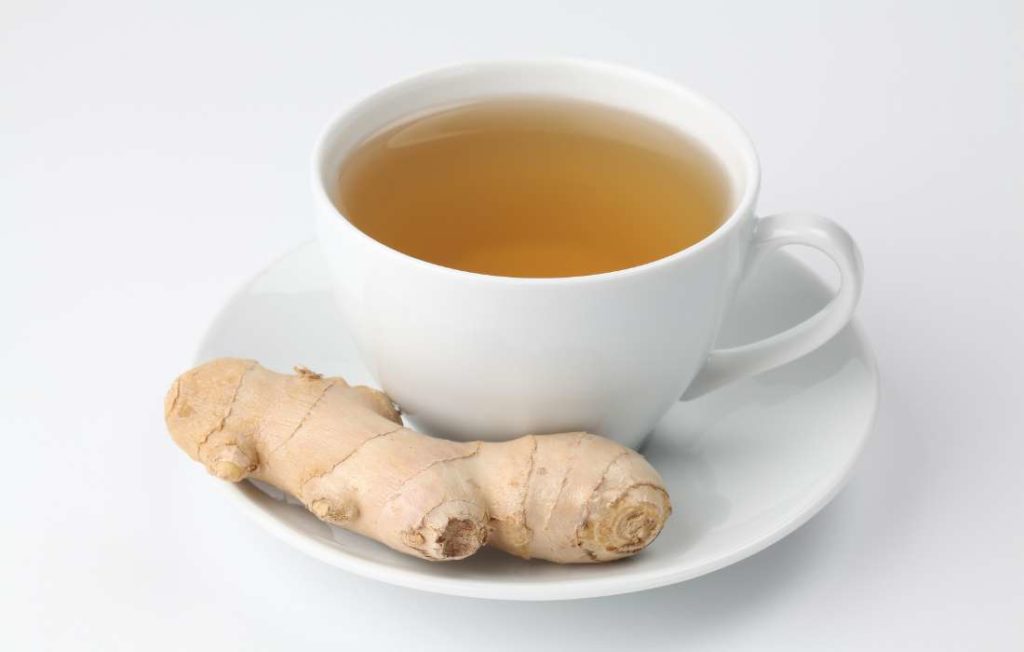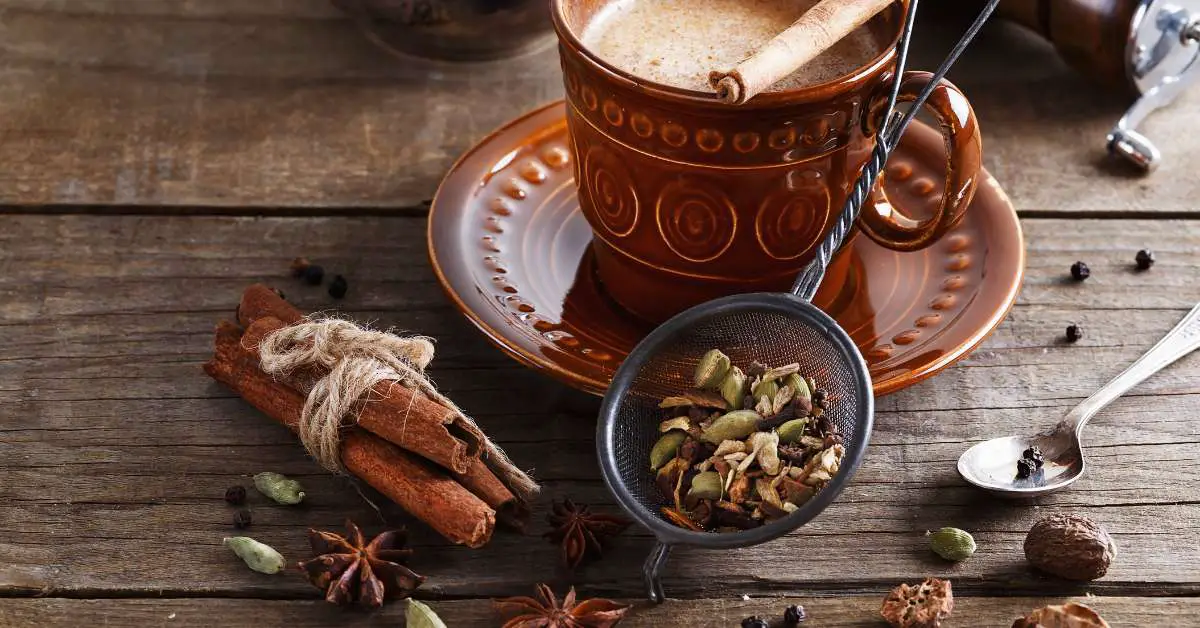Is chai tea low histamine? You’re sipping on a steaming hot cup of chai tea, feeling cozy and relaxed. But suddenly, you wonder if this delightful drink is going to trigger histamine-related issues.
It’s wise to question what you eat and drink when you have histamine intolerance.
If you consume foods or beverages that contain histamine or trigger the release of histamine (histamine liberators), you increase your body’s histamine burden. And that, in turn, can lead to histamine intolerance symptoms. But what about chai tea?
What Is Chai Tea?
Chai tea is like a spicy dance party in your mouth. This much-loved tea is a unique blend of black tea and aromatic spices, some of which have health benefits.
Chai tea is made using bold, dark black tea and an array of spices, including cinnamon, cloves, cardamom, ginger, and even a pinch of nutmeg or black pepper.
It’s the spices that separate chai tea from the typical glass of black tea. The spices give the tea an irresistible warmth. So, it’s not surprising that people around the world enjoy chai tea. But is it safe to sip it if you have histamine intolerance?
Are There Histamines in Chai Tea?
Let’s deconstruct chai tea and see if there are ingredients that could increase your body’s histamine burden. First, as mentioned, chai tea is made from black tea Because black tea undergoes fermentation, it may contain histamine.
Another concern is that components in black tea reduce the activity of diamine oxidase (DAO), the enzyme that breaks down histamine. (2) Therefore, it stays in your system longer.
However, one study found that catechins, a type of antioxidant in tea, combined with caffeine helps stabilize mast cells, immune cells that release histamine and increase your body’s histamine burden.(3) Based on the study, even low concentrations of catechins were able to stabilize mast cells. (3)
This would suggest that the combination of caffeine and catechins could be beneficial for allergic diseases and, possibly, histamine intolerance. It’s an area that needs more research. Until we know more, I would be cautious about consuming black tea or chai tea made from black tea.

The Histamine Content of Chai Tea Spices
Another concern with chai tea is the histamine content of the spices. Some of the spices in chai tea include cardamom, ginger, cloves, cinnamon, nutmeg, and black pepper. However, the exact spices vary depending on the recipe.
Of the spices in chai tea, cinnamon, cloves, and nutmeg are spices that liberate histamine from mast cells. Although you use modest quantities of these spices in chai tea, there may be enough to trigger symptoms if you have very low levels of diamine oxidase, the enzyme that breaks down histamine.
Some versions of chai tea also contain black pepper. Although black pepper is anti-inflammatory, it contains piperine. If you have histamine intolerance, you’re more likely to react to piperine than someone without histamine intolerance. Plus, piperine contains sulfites, which some people are sensitive to. (1)
Most people with histamine intolerance should avoid raw, ground black pepper, as it can trigger or worsen histamine intolerance symptoms.
Some people also experience allergic-type symptoms when they consume foods or supplements that contain piperine, a major ingredient in black pepper.
Is Chai Tea Low Histamine?
Be cautious with chai tea. It’s traditionally made with black tea, which can aggravate histamine intolerance symptoms. However, some people make a version of chai tea using green tea instead.
Green tea is less likely to trigger histamine intolerance symptoms than black tea, as it doesn’t undergo the fermentation that black tea does.
Plus, green tea contains higher levels of catechins that reduce inflammation and may help stabilize mast cells.
If you find you can tolerate green tea and wish to try a green tea version of chai, avoid using high-histamine spices or spices that can worsen histamine intolerance symptoms, like cinnamon, cloves, or nutmeg.
A better option would be to make a cup of ginger tea. Ginger is an anti-inflammatory herb that may be beneficial if you have histamine intolerance by reducing your body’s inflammatory response.
Some studies show ginger reduces pain related to inflammation. (4). The active ingredients, called gingerols and shogaols, may have other potential health benefits as well. (5)
Key Takeaways
- Chai tea could aggravate histamine intolerance if it’s made with black tea.
- Some chai tea spices, including cinnamon, cloves, and nutmeg, could trigger histamine intolerance symptoms. Sulfites and piperine in black pepper may also cause sensitivity symptoms in some people.
- A green tea version of chai is less likely to trigger histamine intolerance symptoms. The catechins in green tea may help stabilize mast cells.
- Ginger tea is a good option, as ginger is an anti-inflammatory herb that may reduce the body’s inflammatory burden and offer additional health benefits.

Histamines in Chai Tea: Should You Be Concerned?
Be cautious about drinking chai tea if you have histamine intolerance. Making chai tea with green tea instead of black tea is less likely to trigger histamine sensitivity symptoms.
You also get more catechins when you drink green tea. The catechins in green may help stabilize mast cells and reduce your body’s inflammatory burden.
Also be mindful of the spices used in chai tea, as some, like cinnamon, cloves, and nutmeg, can stimulate histamine release if you’re highly sensitive.
If you’re looking for an alternative to traditional tea that also has anti-inflammatory properties, ginger tea is a healthy and satisfying option. But keep in mind, your sensitivity may differ from someone else’s. So, listen to your body.
To wrap it up, as you embark on your chai tea adventure, keep in mind the potential histamine-related considerations.
Explore green tea or ginger tea alternatives, avoid high-histamine spices, and savor the delightful flavors that suit your unique taste buds. Also, consider other low-histamine tea options.
Cheers to finding the perfect brew that keeps you cozy, relaxed, and histamine-intolerance friendly! Now, find out whether coconut water contains histamines and about the histamine content of matcha.
References:
- Nicklas RA. Sulfites: a review with emphasis on biochemistry and clinical application. Allergy Proc. 1989 Sep-Oct;10(5):349-56. doi: 10.2500/108854189778959876. PMID: 2684756. https://pubmed.ncbi.nlm.nih.gov/2684756/
- Maintz L, Novak N. Histamine and histamine intolerance. Am J Clin Nutr. 2007 May;85(5):1185-96. doi: 10.1093/ajcn/85.5.1185. PMID: 17490952.
- Yashima M, Sato Y, Kazama I. Catechin synergistically potentiates mast cell-stabilizing property of caffeine. Allergy Asthma Clin Immunol. 2021 Jan 6;17(1):1. doi: 10.1186/s13223-020-00502-5. PMID: 33407842; PMCID: PMC7789391. https://www.ncbi.nlm.nih.gov/pmc/articles/PMC7789391/
- Mashhadi NS, Ghiasvand R, Askari G, Hariri M, Darvishi L, Mofid MR. Anti-oxidative and anti-inflammatory effects of ginger in health and physical activity: review of current evidence. Int J Prev Med. 2013 Apr;4(Suppl 1):S36-42. PMID: 23717767; PMCID: PMC3665023.
- Semwal RB, Semwal DK, Combrinck S, Viljoen AM. Gingerols and shogaols: Important nutraceutical principles from ginger. Phytochemistry. 2015 Sep;117:554-568. doi: 10.1016/j.phytochem.2015.07.012. Epub 2015 Jul 27. PMID: 26228533. https://pubmed.ncbi.nlm.nih.gov/26228533/

